Transcription of CHEMISTRY 20–30 Program of Studies - Alberta.ca
1 Alberta Education, Alberta, Canada CHEMISTRY 20 30 /1 Program RATIONALE AND PHILOSOPHY Science programs provide opportunities for students to develop the knowledge, skills and attitudes they need to become productive and responsible members of society. The programs also allow students to explore interests and prepare for further education and careers. Students graduating from Alberta schools require the scientific and related technological knowledge and skills that will enable them to understand and interpret their world.
2 They also need to develop attitudes that will motivate them to use their knowledge and skills in a responsible manner. To become scientifically literate, students need to develop a knowledge of science and its relationship to technologies and society. They also need to develop the broad-based skills required to identify and analyze problems; to explore and test solutions; and to seek, interpret and evaluate information. To ensure relevance to students as well as to societal needs, a science Program must present science in a meaningful context providing opportunities for students to explore the process of science, its applications and implications, and to examine related technological problems and issues.
3 By doing so, students become aware of the role of science in responding to social and cultural change and in meeting needs for a sustainable environment, economy and society. Program Vision The secondary science Program is guided by the vision that all students, regardless of gender or cultural background, are given the opportunity to develop scientific literacy. The goal of scientific literacy is to develop in students the science-related knowledge, skills and attitudes that they need to solve problems and make decisions and, at the same time, to help students become lifelong learners who maintain their sense of wonder about the world around them.
4 Diverse learning experiences within the science Program provide students with opportunities to explore, analyze and appreciate the interrelationships among science, technology, society and the environment and to develop understandings that will affect their personal lives, their careers and their futures. CHEMISTRY 20 30 Program of Studies 2007 (Updated 2014) Updates Minor revisions were made in 2014 and are described in 2014 Summary of Updates. 2/ CHEMISTRY 20 30 Alberta Education, Alberta, Canada Goals The following goals for Canadian science education, developed in the Common Framework of Science Learning Outcomes K to 12: Pan-Canadian Protocol for Collaboration on School Curriculum (1997), are addressed through the Alberta science Program .
5 Science education will: encourage students at all grade levels to develop a critical sense of wonder and curiosity about scientific and technological endeavours enable students to use science and technology to acquire new knowledge and solve problems so that they may improve the quality of their lives and the lives of others prepare students to critically address science-related societal, economic, ethical and environmental issues provide students with a foundation in science that creates opportunities for them to pursue progressively higher levels of study, prepares them for science-related occupations and engages them in science-related hobbies appropriate to their interests and abilities develop in students of varying aptitudes and interests a knowledge of the wide spectrum of careers related to science, technology and the environment.
6 Aboriginal Perspectives Courses in the senior high school sciences incorporate Aboriginal perspectives in order to develop, in all students, an appreciation of the cultural diversity and achievements of First Nations, M tis and Inuit (FNMI) peoples. These courses are designed to: acknowledge the contributions of Aboriginal peoples to understandings of the natural world support relational thinking by integrating learning from various disciplines of science develop the concept of humankind s connectivity to the natural world and foster an appreciation for the importance of caring for the environment foster the development of positive attitudes by providing experiences that encourage all students to feel confident about their ability to succeed in science.
7 Information and Communication Technology (ICT) Selected curriculum outcomes from Alberta Education s Information and Communication Technology (ICT) Program of Studies are infused throughout the 20-level and 30-level sciences so that students will develop a broad perspective on the nature of technology, learn how to use and apply a variety of technologies, and consider the impact of ICT on individuals and society. The infusion of ICT outcomes supports and reinforces the understandings and abilities that students are expected to develop within Foundation 3 (Science, Technology and Society) and Foundation 4 (Skills) of these courses.
8 Effective, efficient and ethical application of ICT outcomes contributes to the Program vision. Infusion of ICT outcomes provides learning opportunities for students to: understand the nature of technology and apply terminology appropriately use equipment carefully and share limited ICT resources use technology in an ethical manner, including respecting the ownership of information and digital resources and citing electronic sources use technology safely, including applying ergonomic principles and appropriate safety procedures use the Internet safely, including protecting personal information and avoiding contact with strangers use technology appropriately.
9 Including following communication etiquette and respecting the privacy of others. Alberta Education, Alberta, Canada CHEMISTRY 20 30 /3 Program FOUNDATIONS To support the development of scientific literacy, a science Program must provide learning experiences that address critical aspects of science and its application. These foundations provide a general direction for the Program and identify the major components of its structure. Program Rationale and Philosophy Foundation 1 Foundation 2 Foundation 3 Foundation 4 ATTITUDES KNOWLEDGE SCIENCE.
10 TECHNOLOGY AND SOCIETY SKILLS Interest in Science Mutual Respect Scientific Inquiry Collaboration Stewardship Safety Life Science Physical Science Earth and Space Science Nature of Science Science and Technology Social and Environmental Contexts of Science and Technology Initiating and Planning Performing and Recording Analyzing and Interpreting Communication and Teamwork Change Diversity Energy Equilibrium Matter Systems Foundation 1 Attitudes Students will be encouraged to develop attitudes that support the responsible acquisition and application of scientific and technological knowledge to the mutual benefit of self, society and the environment.

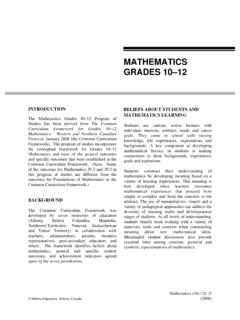


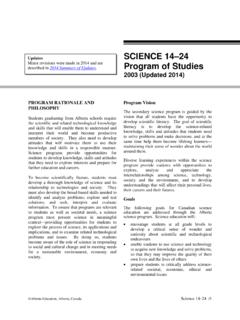
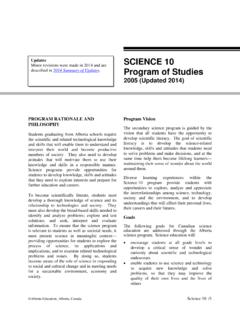

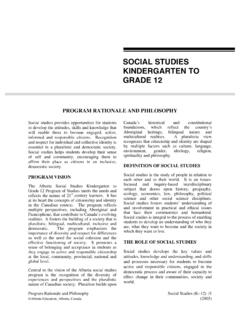




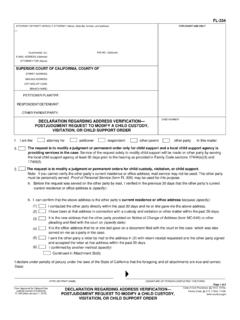
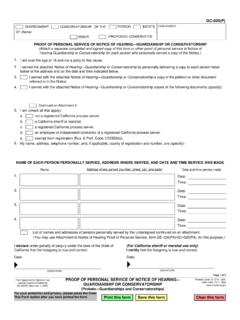
![The Ontario Curriculum, Grades 1-8, Language [revised] 2006](/cache/preview/d/5/3/5/d/c/7/4/thumb-d535dc7439a04910d8a17bf7f1d6b83f.jpg)
